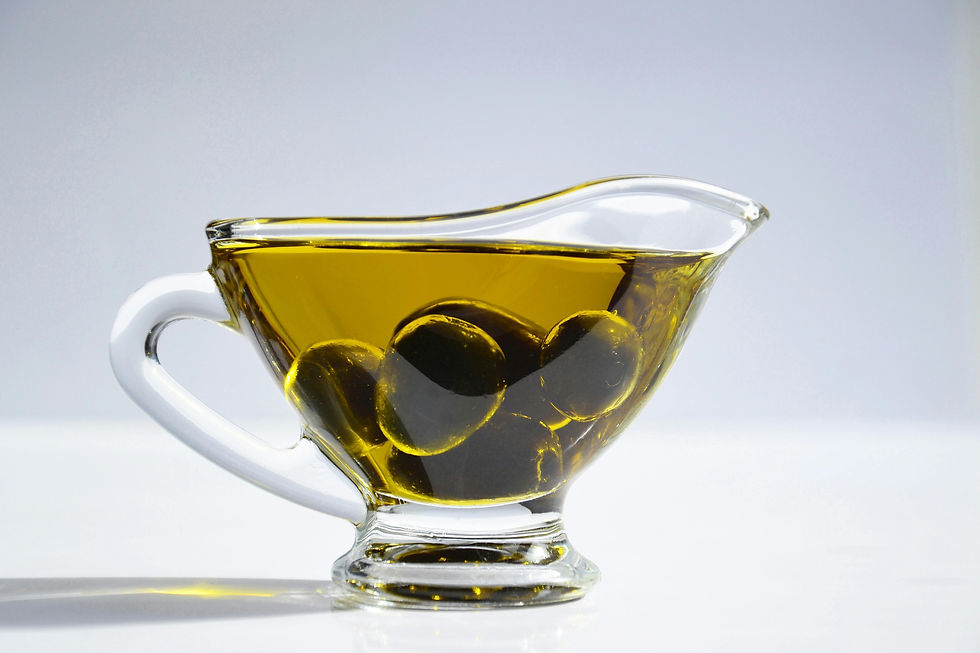Blaming seed oils misses the mark on wellness
- Audrey
- Jan 19
- 4 min read
Updated: Feb 11
The wellness community has recently turned its focus to vilifying seed oils, but the true harm to our health lies in the lack of moderation and the overconsumption of processed foods where these oils are often found. In 2024, seed oils became the latest target in the ever-evolving cycle of diet trends. Demonizing specific foods is nothing new — whether it’s eggs, bread, or even fresh vegetables, health enthusiasts always seem to find a common scapegoat. The real issue isn’t the oils themselves but the heavily processed foods they’re often a part of, coupled with the failure to focus on moderation, which come with their own host of health risks.

Seed oils are cooking oils extracted from the seeds of various plants and and are also sometimes known as vegetable oils. Common examples include canola, soybean, grapeseed and corn oils. They tend to have lower smoke points for cooking and are less expensive than potentially healthier alternatives like coconut or olive oils. Seed oils are prevalent in packaged foods including chips, crackers, cookies, fried foods, salad dressings and spreads, but many people also use them in their own kitchens, adding them to baked goods or using them for frying.
Critics of seed oils argue that the chemical or mechanical extraction process leaves toxic hexane in the final product, though it's actually evaporated during processing. Seed oils are also high in omega-6 fats, which some people believe cause inflammation, but studies in healthy human adults have found that increased intake does not increase the concentrations of many inflammatory markers. In fact, some epidemiological studies have even suggested that the fatty acid produced by omega-6 may actually be linked to reduced inflammation. In essence, there is not yet enough research to claim definitively if seed oils cause or reduce inflammation on their own.
It’s not entirely unfounded for consumers to be skeptical of seed oils, but the real concern lies in the fact that they're common ingredients in ultra-processed foods (UPFs). UPFs are products that have undergone significant chemical modifications, such as the addition of artificial flavors, colors, sweeteners, thickeners or preservatives to enhance shelf life. These products are often high in sugar, fats, and salt, while being low in fiber and protein. Research suggests that UPFs can cause blood sugar spikes, increase gut inflammation and leave you feeling unsatisfied. But, they're affordable and convenient, making them a go-to choice for busy individuals. Their extended shelf life and accessibility have made them staples in many households. Shockingly, recent data shows that almost two-thirds of caloric intake in adults comes from UPFs, including items like:
Chips
Ice creams and frozen desserts
Energy drinks, sodas and juices
Canned, packaged, dehydrated and other instant soups
Bread
Breakfast cereals and bars.
Salad dressings
These foods can contribute to more than 30 health conditions including cardiovascular disease, mental health disorders and type two diabetes. For example, high consumption of processed sugars and unhealthy fats can lead to insulin resistance, increasing the risk of type two diabetes. The excessive salt and preservatives in UPFs can contribute to high blood pressure, which raises the risk of cardiovascular disease, heart attacks and strokes. Additionally, the lack of fiber and essential nutrients in these foods can negatively affect gut health, leading to inflammation, digestive issues and an increased vulnerability to chronic conditions. Over time, the combination of poor nutrition, high calorie intake and chemical additives can disrupt overall bodily functions.
Alternatively, consuming unprocessed or minimally processed foods may help reduce inflammation, prevent obesity and manage blood sugar. Unprocessed foods include the natural parts of plants and animals, while minimally processed foods are slightly altered to without significantly changing their nutritional value. Foods like fruits, vegetables, whole grains, nuts, meats, plain yogurt, pasta, and milk fall into these categories. That being said, it's important to remember that there’s no need to feel guilty about enjoying your morning bowl of cereal or a sandwich at lunch every once in a while. I believe in building a healthy diet around the principle of moderation. While it’s beneficial to incorporate unprocessed or minimally processed foods into your meals whenever possible, it’s equally important to listen to your body and honor your cravings from time to time. This balanced approach fosters a positive relationship with food, supporting both your physical health and your overall well-being. If you are looking for ways to swap frequently used UPFs, here are some suggestions:
Oatmeal made from fresh oats instead of cereal
Fresh vegetables instead of canned
Fresh-squeezed juice instead of premade
Homemade pastries instead of packaged sweets
Home-prepared meats saved in the fridge or freezer instead of packaged meals
In the end, seed oils themselves aren’t the true villains they’ve been made out to be. The real issue lies in the overconsumption of UPFs, where these oils are just one of many ingredients contributing to health concerns. Blaming a single component oversimplifies a complex issue and distracts from the bigger picture: the importance of a balanced diet and moderation. By focusing on whole, minimally processed foods and making informed choices, we can take meaningful steps toward improving our overall health without unnecessary fearmongering.





Comments